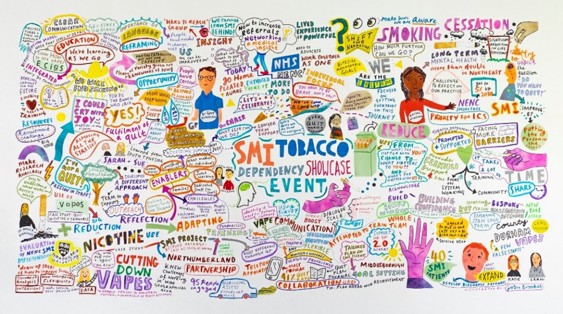Lessons learnt from implementing an enhanced smoking cessation offer for adults with severe mental illness
Whilst across the North East North Cumbria (NENC) smoking rates have continued to decline with the North East seeing the fastest decline in England, the same cannot not be said for certain groups such as adults with mental health conditions who smoke at a higher rate than the general population. In fact, the data we have available from 2022 points to smoking rates particularly in adults with severe mental illness (SMI) at around 42% which is over 3 times the general North East smoking rate. This significant inequity is demonstrated starkly in health outcomes for people with mental health conditions who die on average 10-20 years earlier than the general population. It might be easy to assume this is down to increased suicide rates or psychiatric events but sadly this isn’t the case, but rather as a result of a number of socio-economic and healthcare factors with smoking being the single largest contributor to reduced life expectancy.
When we first were asked by NHS England to pilot an enhanced cessation offer for adults with Severe Mental Illness (SMI) as part of their Early Implementer Sites (EIS), I was filled with a mixture of optimism and trepidation. The former because for years we have known about the significant health inequalities this subset of our population experiences and despite abundant evidence that they were equally motivated to consider quitting we had done little to address their dependence so this presented a valuable opportunity to do just that. But on the other hand the reality of being asked to stress test a primary care model with very complex clientele and differing cessation services (actors) play filled me with a small degree of trepidation. Were we biting off more than we could chew? In the end because of the passion of many working in this space in the region, we did become one of the seven (EIS) with a focus on identifying smokers coming in for the physical health check and referring them on to enhanced support to quit smoking.
What followed was twenty four months of tirelessly working with our four Local Authority (LA) Early Implementer Pilot Sites (Middlesbrough, South Tyneside, Durham and Northumberland) to mobilise and implement an enhanced offer of support for adults with SMI. Thankfully the amazing teams at the four LA Sites, the clinical lead (Dr Ruth Sharrock), Senior Responsible Officer (Dr Guy Pilkington), project team (Guy Nokes & Caitlin Robinson), the Taskforce and wider steering group members including some experts by experience made what initially felt like a daunting task a realistic intervention.
Over the course of the two years we were able to host two best practice events in Durham and Newcastle. The first was created to showcase the work across the region and inspire other localities to do the same. The illustration below shows the breadth of the discussion at one of these workshops.

The second event was a workshop designed for staff working in healthcare, mental health, and local authorities who were keen to:
- Understand the complex relationship between tobacco dependency and serious mental illness.
- Gain insights into effective interventions and support strategies.
- Learn from local case studies and evidence-based practices.
- Collaborate with peers to share experiences and develop practical solutions.
Since then we have since worked with colleagues from Northumbria University who were commissioned to lead and independent evaluation of the intervention. The evaluation highlighted the importance of:
1. No wrong door approach- professionals should feel empowered to identify and support individuals with SMI to get the right cessation support and regardless of how they are referred or what service they initially engage with.
2. Harnessing evidenced based quitting aids- a range of cessation tools such as nicotine vapes, and pharmacotherapy should be readily available for adults with SMI who are tobacco dependent to give them the best chance of quitting.
3. One size doesn’t fit all: rather support should person centred and flexible.
A report and corresponding lay summary have also been produced. The Research Team have now also published a briefing to summarise the study which can be viewed here: FUSE Brief.
But for all I’ve shared of what we have done in the last two years it boils down to impact. Have any lives been changed by our approach? I’m happy to say yes with numerous case studies shared with our services of the impact having flexible and person-centred support can make to assisting that person to quit long term. Feedback from various beneficiaries of the enhanced offer included comments like:
“I know that tar sticks to my lungs, carbon monoxide travels through my blood and nicotine is very addictive. Now I have stopped smoking I am only having clean nicotine”
“I think getting over the initial idea that smoking will help your anxiety-it doesn’t! I also think that you have to be ready to quit, and if you’re feeling low and are doubting your motivation to quit, seek support and speak openly about it.”
A closer to home example of why this is so important is shown by Claire Atkins, a Senior Peer Worker with Tees Esk and Wear Valley NHS Foundation Trust and expert by experience of severe mental illness. She started smoking at 13 and by 14 had left home, and by 16 she was living in supported housing. During a traumatic time in her life, she turned to cigarettes, alcohol and drugs to cope. Claire quit smoking six months ago. She now feels much healthier and happier.
Claire said “I’m delighted that it’s becoming a priority. It’s long overdue – and it gives me hope for others who are still in that cycle.” You can watch Claire’s video here.
We had 318 people referred through the services throughout the pilot, 295 set a quit date and 98 successfully quit at 28 days. The results and lessons learned from the pilot have helped to inform an ongoing community cessation project with one of our Mental Health Trusts Cumbria Northumberland Tyne & Wear NHS Foundation Trust.
The challenges to engage and support this underserved cohort of the population still remains and every opportunity I get, I ask these questions to policy makers, commissioners and stop smoking practitioners:
- How flexible and person-centred is your current smoking cessation support for people with mental health conditions? Are there ways it could be adapted to better meet their needs across different care settings?
- What barriers might people with severe mental illness face when accessing your service, and how could your service be redesigned or enhanced to overcome them?
We cannot afford to leave those with mental health behind so let’s do all we can to help them stop smoking.
Written by Rachel Mcilvenna, Smokefree NHS Strategic Manager, North East North Cumbria Integrated Care System
